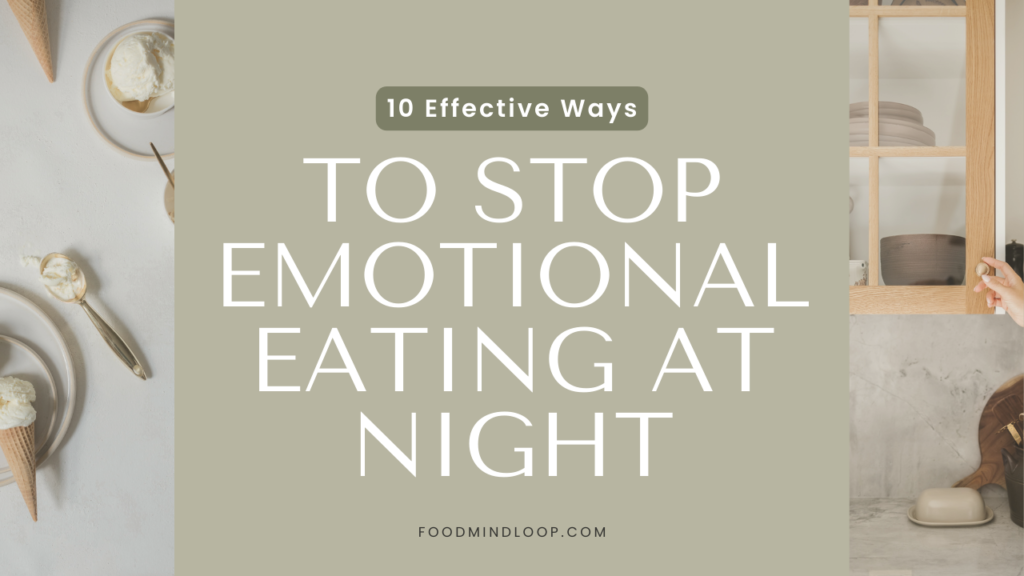If you’re reading this, chances are you’ve experienced those late-night snack attacks where the fridge seems to call your name. Emotional eating at night is something many of us struggle with, especially after a long, stressful day. It’s easy to reach for food for comfort, but this habit can lead to unwanted weight gain, poor sleep, and a rocky relationship with food.
In this blog post, you’ll learn:
- what emotional eating is,
- why it often strikes at night, and, most importantly,
- share 10 effective ways to break this habit and feel better overall.
What Is Emotional Eating and Why Does It Occur at Night?

Defining Emotional Eating
So, what exactly is emotional eating?
Simply put, it’s when you eat in response to your feelings rather than because you’re physically hungry.
It’s using food to deal with emotions like stress, loneliness, or boredom. While it might give you a quick fix, it often leads to overeating and feeling bad about yourself later.
Psychological Triggers
There are a several reasons why emotional eating happens, especially at night.
Stress from work, relationship issues, or just a busy day can make you turn to food for comfort.
At night, when you’re finally alone with your thoughts, those emotions can feel overwhelming, making the kitchen seem like a safe haven.
Physiological Factors
Our bodies also play a part in this. Once emotional eating at night has become a habit for you, your body will start sending you hunger signals at that time.
Our natural body clock can also trigger cravings for high-calorie foods as the evening approaches. This happens because when you’re tired, your body craves quick energy, often leading to those late-night munchies.
Why Emotional Eating at Night Can Be a Problem
Health Issues
When emotional overeating late at night becomes a habit, it can cause several health problems. One of the main concerns are digestive issues and bloating since your body isn’t as efficient at processing food when you’re winding down for bed.
Sleep Disruption
Eating heavy or sugary foods before bed can mess with your sleep. Poor sleep can then throw off your hunger hormones, making you more likely to overeat the next day, creating a vicious cycle.
Emotional and Psychological Consequences
Emotional eating can leave you feeling guilty and ashamed, adding to your emotional distress. Over a longer period of time, it can affect your mental health, making you feel even more anxious or depressed.
Impact on Long-Term Eating Habits
Relying on food to cope with emotions can create unhealthy eating patterns that are hard to break. It can make it difficult to develop a healthy and balanced relationship with food.

10 Effective Ways to Stop Emotional Eating at Night

Identify Triggers
Start by keeping a food journal. Write down what you eat, when you eat it, and what you’re feeling at the time. This can help you spot patterns and understand what’s triggering your emotional eating.
Develop a Bedtime Routine
Creating a relaxing bedtime routine can reduce stress and help you sleep better. Try reading, taking a warm bath, or doing some gentle yoga before going to bed.
Honor Your Hunger
Make sure you don’t try to restrict food during the day (yes, even if you overate the night before!). If you restrict the amount or type of food you eat during the day, your nighttime cravings will be much worse.
Give Your Body the Nutrients it Needs
Make sure your meals are nutritious and filling to avoid nighttime hunger. Include a good mix of proteins, healthy fats, and complex carbs.
5. Practice Mindful Eating
Mindful eating means paying attention to what and how you eat. Eat without distractions, savor each bite, and listen to your body’s hunger cues. Practice this during the day first, so it’ll be much easier for you to implement when you’re feeling overwhelming or tired at night.
6. Find Alternative Coping Mechanisms
Instead of turning to food every time, find other ways to deal with your emotions. Engage in activities you enjoy or spend time with loved ones. Relaxation techniques like meditation or deep breathing can also help.
7. Don’t Judge Yourself
Beating yourself up for “being weak” or having “no self-control” are not bringing you any closer to your goal of overcoming emotional eating. Instead, try to be curious about what could be triggering those episodes of overeating, so you can figure out what you need to do differently next time.
8. Address Your Triggers
It’s not only important to learn different coping skills to deal with emotions (Number 6), but it’s also very helpful to dig deeper and deal with whatever is causing those triggering emotions in the first place.
9. Figure Out Which Need is Being Covered by Emotional Eating
A great place to start when you’re addressing your triggers is figuring out which need is being covered with overeating in that moment. Is it a need for comfort, for connection, for safety, for distraction, or maybe something else?
10. Get Adequate Sleep
Make sleep a priority by setting a regular sleep schedule and creating a sleep-friendly environment. Sleep deprivation can affect the way certain hormones, like leptin, are released, which causes our brain to override the other signals that the body may be full.
Top 5 FAQs About Emotional Eating At Night
Emotional eating is when you eat in response to your feelings rather than actual hunger. It’s often a way to cope with emotions like stress, anxiety, or boredom.
Nighttime eating can be triggered by stress, hormonal changes, and food restriction or dieting. It can also end up being established as a habit, which makes it even harder to eliminate.
Emotional hunger usually comes on suddenly and is specific to certain comfort foods. Physical hunger builds gradually and can be satisfied with a variety of foods.
Yes, many people can overcome emotional eating with self-awareness and practical strategies. A great place to start is the book “The DBT solution for Emotional Eating” by D.L. Safer, S. Adler and P. Masson. However, professional help from a therapist or nutritionist can provide extra support and guidance.
Breaking the habit of emotional eating can vary from person to person. It depends on how ingrained the habit is and the strategies you use to address it. With consistent effort and support, many people start to see positive changes within a few weeks.

Summary
Emotional eating at night can feel very difficult to deal with, but it’s definitely doable with the right strategies and support.
By figuring out your triggers, setting up a bedtime routine, eating nourishing meals throughout the day, and practicing mindful eating, you can take control of those nighttime cravings. Finding other ways to cope with stress, honoring your cravings during the day and prioritizing sleep are also key steps in overcoming emotional eating.
Remember, it’s all about progress, not perfection. Take it one step at a time and make sure you reach out for support when you need it.

